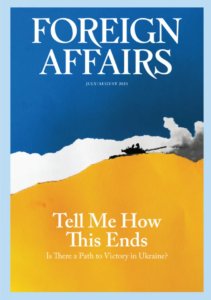 In the quarter century after the Cold War ended, Western countries largely believed—or at least hoped—that the Soviet Union’s dissolution would inaugurate a new normal of benign relations between democracies and autocracies, notes Eurasia Group analyst Ali Wyne, #Ethe author of America’s Great-Power Opportunity: Revitalizing U.S. Foreign Policy to Meet the Challenges of Strategic Competition.
In the quarter century after the Cold War ended, Western countries largely believed—or at least hoped—that the Soviet Union’s dissolution would inaugurate a new normal of benign relations between democracies and autocracies, notes Eurasia Group analyst Ali Wyne, #Ethe author of America’s Great-Power Opportunity: Revitalizing U.S. Foreign Policy to Meet the Challenges of Strategic Competition.
But that assessment no longer holds. The West increasingly, and understandably, regards interdependence not as a stabilizing factor in its relations with China and Russia but as a potential vulnerability, he writes for Foreign Affairs:
If an earlier era of globalization led to what the political economists Henry Farrell and Abraham Newman have called “weaponized interdependence”—in which states that control key information and financial hubs coerce and punish others—the years to come could produce what might be called “weaponized detachment,” in which greater economic independence emboldens states to act more aggressively. In other words, Beijing and Moscow could become less fearful of contesting Western influence and more likely to deepen their partnership, especially if they are able to bolster ties with nonaligned powers and countries across the developing world.
 China is in demographic decline and experiencing slowing growth, and the world’s advanced industrial democracies are increasingly aligned against it. Beijing has little prospect of achieving hegemony in Asia, let alone overtaking Washington and establishing a new unipolar order, adds Wyne, a former Penn Kemble fellow at the National Endowment for Democracy (NED).
China is in demographic decline and experiencing slowing growth, and the world’s advanced industrial democracies are increasingly aligned against it. Beijing has little prospect of achieving hegemony in Asia, let alone overtaking Washington and establishing a new unipolar order, adds Wyne, a former Penn Kemble fellow at the National Endowment for Democracy (NED).
Nevertheless….
Above all else, the West should accept that China and Russia are likely to endure. Recent history may encourage the United States and Europe to pursue obtain a total victory, as the Allied powers achieved over Germany and Japan in World War II and as Washington ultimately did over Moscow when the Soviet Union collapsed in the late 1980s. But such an outcome is unlikely to happen today. The long-term challenge for the West, then, is to manage the risks that come from both dependence and detachment—and figure out how to live with them. RTWT







